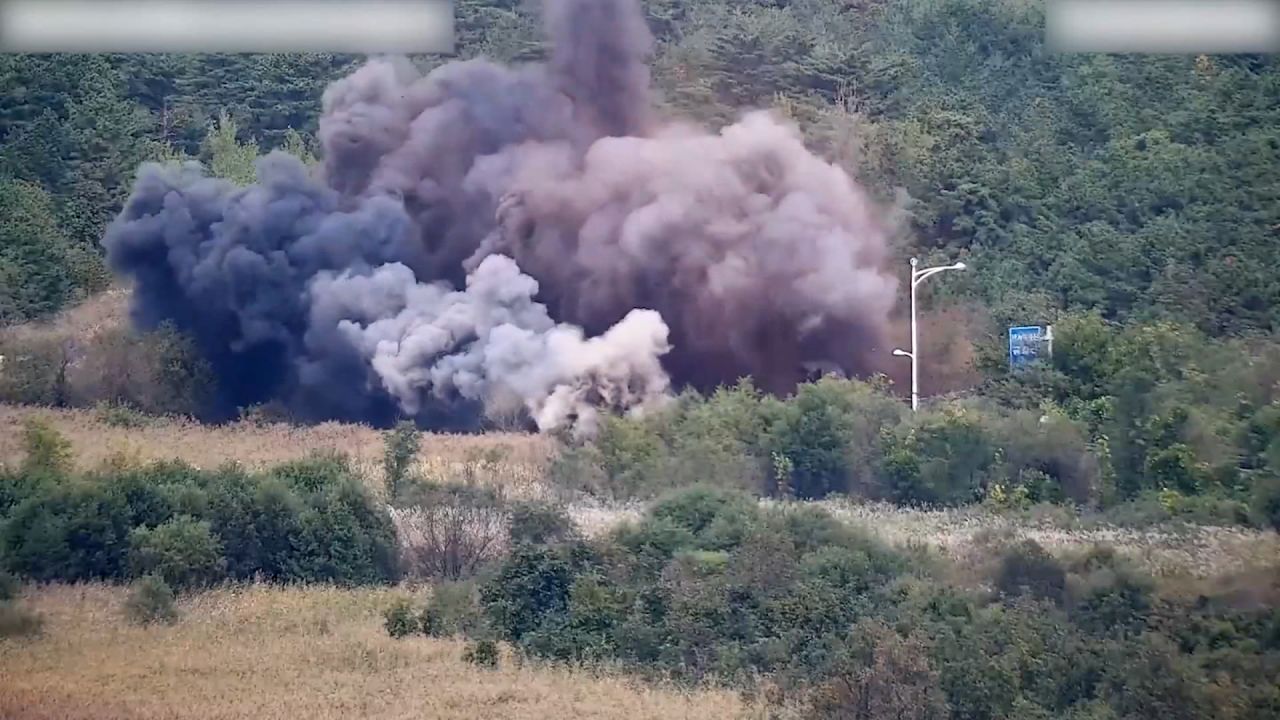Tensions between North and South Korea have reached a new level as Pyongyang destroyed two critical roadways connecting the countries on Tuesday. The move follows North Korea’s earlier threats to sever all ties with the South, marking another chapter in the long-standing conflict between the two nations. The destruction, while largely symbolic, underscores the strained relations on the Korean Peninsula.
Destruction of Key Roads
According to South Korean authorities, North Korea detonated explosives on sections of the Gyeongui and Donghae lines—two major road and railway links. These roads, located on the West and East coasts respectively, have connected North and South Korea for decades, though they had not been in active use for several years.
“The blasts were carried out at approximately 12 p.m. Korean time,” Seoul’s Joint Chiefs of Staff (JCS) reported. The destruction comes as part of North Korea’s strategy to distance itself from the South, in both a literal and figurative sense. Videos released by the South Korean Defense Ministry show several explosions followed by the deployment of heavy machinery, indicating further work is being conducted at the site.
Though the roads had long been inactive, their destruction holds powerful symbolic meaning amid the rising tension between the two Koreas. The South Korean military remains vigilant, with JCS spokesperson Lee Sung-joon confirming, “We have detected additional activities and are maintaining full readiness in cooperation with the US.”
Escalating Tensions Between the Two Koreas
The destruction of these roads is only the latest event in a series of aggressive actions and heated rhetoric. A few days prior, North Korea accused South Korea of flying propaganda-filled drones over its capital, Pyongyang. In retaliation, North Korea threatened to completely sever all territorial connections with the South.
“The acute military situation prevailing on the Korean peninsula requires the armed forces of the DPRK to take more resolute and stronger measures,” stated the general staff of the Korean People’s Army (KPA), referring to the country by its official name, the Democratic People’s Republic of Korea (DPRK). The general staff further claimed that these steps are necessary to defend North Korea’s national security, citing recent military exercises held in South Korea and the presence of US nuclear assets in the region.
Military Posturing and Nuclear Threats
Tensions between North and South Korea are nothing new, but recent months have seen an increase in military threats. North Korean leader Kim Jong Un recently warned that he would use nuclear weapons if North Korea was attacked. This came after South Korea’s president issued a stern warning that any use of nuclear weapons by the North would result in “the end of its regime.”
Leif-Eric Easley, a professor at Ewha Womans University in Seoul, suggests that North Korea’s aggressive actions could be motivated by internal issues rather than actual military strategy. “Kim Jong Un wants domestic and international audiences to believe he is acting out of military strength, but he may actually be motivated by political weakness,” Easley explained. North Korea’s economic struggles and its efforts to increase nuclear production appear to be at the heart of its recent behavior.
A Long-Standing Conflict
North and South Korea have been divided since the Korean War ended in 1953 with an armistice agreement, though they technically remain at war. Efforts at reconciliation and reunification have been abandoned by Kim Jong Un, who, in January, called inter-Korean relations “a relationship between two hostile countries and two belligerents at war.”
While the destruction of the Gyeongui and Donghae roads may not have immediate practical consequences, it serves as a reminder of the fragile peace on the Korean Peninsula and the continuing volatility of relations between North and South Korea.
The Road Ahead
North Korea’s destruction of critical roadways may symbolize the breaking point in its already fraught relationship with South Korea. As military threats escalate and the possibility of nuclear confrontation looms, the world watches closely. How the South, along with its allies, responds to these provocations will be crucial in determining the next phase of this ongoing conflict.







